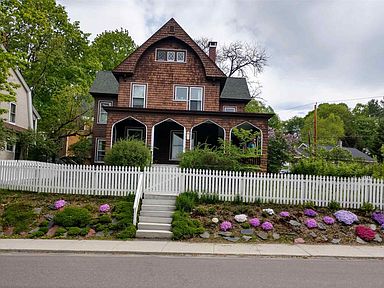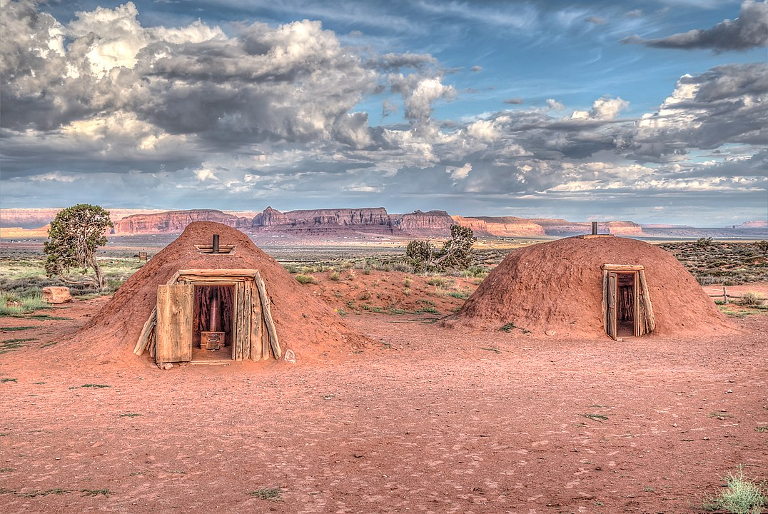As you are reading this, I’m moving into the first home I’ve bought. Consequentially, I’m thinking quite a bit about what home means. What it means to me, what it means in the abstract, what it means for our collective culture.

Picket fence and all!
Many of the common ideas about home in Euro-western culture seem impractical, harmful even. I don’t believe these beliefs are very old or very common among other cultures. Beliefs about home in this culture seem to flow from the prerogatives of capitalism and empire and colonizing. Home as a place to warehouse labor. Home as the source of marketable needs. Home as a statement of individual expression that drives consumption.
There is little of the traditional notion of home in my part of the world. In the traditional world, home is the center of production and reproduction. Home is the base, the core, of the family or tribe. Home is a collective. Home is less a structure than the soil that supports it. Home is a fixed place. It is not merely “where the heart is” which strikes me as a facile gloss on capitalism’s need to keep us all unrooted. The vaunted “flexible” labor market, that which is constantly grinding greater productivity (i.e. labor) out of lower cost (i.e. laborer wages).
This culture of mine does not have a home. This is a culture of immigrants. Most of us, and most importantly, most of the people who control all the narrative and symbolism in this culture are from elsewhere. They are not native. This is true not merely of those of European descent in former colonies around the globe, it’s also true of Europeans in Europe. Euro-western culture is very young and has been very mobile since its inception. Myths in European cultures look to distant homelands or to no permanent home at all. It is difficult for Euro-westerners to understand just how odd this notion is to the rest of the world. We don’t have the words for traditional notions of home.
Compare the idea of going out to conquer new lands to the idea of coming out of the center of the world and remaining there as a fundamental part of that homeland. Indigenous cultures the world round have variants of this origin myth and the language to describe it, the idea that “our home has always been here”. Similarly, most consider the tribe to be more than a group of humans, never mind a group of genetically-related humans. Many people feel a deep, existential bond to the more-than-human world, beginning with the geophysical place they inhabit.
English does not even have a good word to name this relationship with home-place. Inhabit, dwell, home — these are all superficial, androcentric, individualistic, and transient in etymology. They are also strictly nouns, whereas many other languages define home as a noun with active attributes, a verb-noun. For example, the word for homeland in Navajo, Dinétah, translates into “area/place through/among the people”. This is an interpenetrating concept that English can’t even express clearly. What does it mean for a place to be “among the people”? And that doesn’t begin to account for the ways in which Diné, people, is defined. Most Navajos count mountains, rivers, corn, stars, and a great many other being-states as people within their tribe.
Similarly, there is an Apache saying — wisdom sits in the places — that is functionally meaningless in English but is the essence of existence for these peoples. This is the definition of home as right relationship with very specific parts of the world. It is expressed in a vast body of story and lore, some generalized, but most so specific as to refer for example to individual rocks at particular times of the day and year. This is home as a complex web of being. And it is permanently fixed.
Wes Jackson has begun to redefine home for our culture. His phrase — becoming native to this place — is based in his ideas of perennial agriculture. (Wes is the founder of the Land Institute in Kansas, an organization dedicated to developing perennial, and therefore no-till, grain.) But it speaks to a deeper motive, the need for humans to become rooted as well, to become as much a part of our homelands as the soils, plants and other animals in that place. It is an active concept, a becoming, not merely a being. It implies a life cycle, not just a life — native implies birth, not merely residence. Becoming native to a place is to begin a cycle of birth and regeneration in partnership with a specific location that supports that cycle. This idea is much closer to Navajo Dinétah than English home.
The advantages to a fluid idea of home do not accrue to most humans. Certainly a transient human world is bad ecology. It encourages separatism and duality. The idea that humans are not a part of any given place means that humans are not dependent upon, owe no allegiance or care to, and are free to leave any given location — meaning every given location. When humans are native to no place, they are free to use the place until there is no utility left. They do not have to bear the results of that use. They owe nothing in the way of rehabilitation or preservation. It is not their place.
Unrooted humans are free to take whatever they want out of a place without paying the costs of that taking. This is extractive economics. This is colonialism. This is how capitalism has been able to thrive. Because in theory, capitalism can’t work. How could more come out of a transaction than went into it? Only if many costs in production are negligible. There are few ways to do this and almost none in the realm of physical things produced for sale where care is taken to limit disruption and where all true costs are paid. Most costs are not paid in capitalism; that’s how it works this black magic. And it is impossible to work that magic if the workers care about and are bonded to their place. They can’t take more than they give. They understand that everybody in that place is hurt when one body takes more than its share. They don’t want that to happen. It hurts to see their places, their web of connection, damaged. And if their connections are damaged, it hurts them too. So capital has been at war with rootedness since its inception. The first step in capitalism is to remove people from their places of connection and expose those places to indifference — leaving them free for exploitation.
This is a far removal from a homeland that is through and among the people. Imagine creating the kind of waste that is the result of strip mining in a place that is through and among your own sense of body. It is not some external inert thing that is being damaged; it is you. And this is not just a philosophical point. This is far closer to reality than any sense that humans are distinct from their surroundings. It is you. Physically. Ecologically, we are bound to where we are. We breathe the air; we ingest whatever is in the soil and water through our food; we depend on many other things — from microorganisms to hydrological systems — just to remain alive. When we damage our places, we damage ourselves. In actuality.
This is why most of those who drive capitalism do not live anywhere near where it is practiced. Only, now the scale of exploitation — and therefore damage — is so vast, there are no reserved places that will protect any bodies, rich or poor, from the damages capitalism is inflicting on this macro-place that is our planet. This is nonsense. In pretending that we are separate from everything else, we are showing just how connected we actually are by dying when we break any part of the everything. When we pretend to be separate from life, then separation from life is quite often the end result. For everyone. Nonsense.
Indigenous cultures, those that are native to their places, thrive because they care for all the things that care for them. They live in a reciprocal relationship that reflects the physical reality of this planet in all places. Home is where the care is.
This idea was once part of Euro-western culture. It was probably indigenous to Europe before the pony pirates came riding out of the east. Most cultures are rooted after all because rooted cultures endure. They are living in right — and therefore healthy and living and ecologically sound — relationship with their places. But even the pony pirate cultures followed these principles once they settled in. (After annihilating many other aspects of the indigenous cultures.) So a couple thousand years later, the pony pirate descendants in what is now Greece created a word for how we meet our needs that is based not on creating wealth but on caring for home.
Economics translates into home management. Imagine if we descendants of Greek ideas had retained that one. Economics is not about distributing stuff; it’s about taking care of ourselves through taking care of our home place. Turns out “wisdom sits in the places” is equivalent to Greek philosophy. Maybe superior, morally and physically, as it does not include artificial and unjust hierarchies in those peoples and places.
I’ve been thinking much about these ideas of home, particularly becoming native to my place. I have moved around quite a lot in my life. I’ve lived on farms, in the suburbs, in the city. I have family — biological and otherwise — spread out thousands of miles apart. I have roots in no place. I would like to create my own roots. I would like to live in that right relationship that cares deeply for my place and is therefore nourished by that place. But how do I do that?
I believe the answer is simple. First of all, be local. Live fully in this place. Eat from this soil. Drink this water. Breathe this air. Love these people — of all people-varieties. Care for my home. Part of caring for my home is caring that other homes are cared for. We have a macro-place now that our activities span the globe. We do things in our local places that affect so many other places — usually adversely. This is a novel situation for humans. We haven’t adapted to the idea that doing life in one place can affect other places. So we have to make conscious effort to do life so we are not mindlessly spreading harm. And that is the other part of the simple answer: do no harm. Anywhere. Because all places are interconnected homes.
I intend to be fully here in this new home. I will care for this place and be with and through and among this place. I will become wise with the knowledge this place holds. And I will become native — healthy, regenerative and in right relationship — to this place. This is my home.
©Elizabeth Anker 2021
Teaser photo credit: Navajo hogan at Monument Valley Navajo Tribal ParkBy Dsdugan – Own work, CC BY-SA 4.0, https://commons.wikimedia.org/w/index.php?curid=58551261





